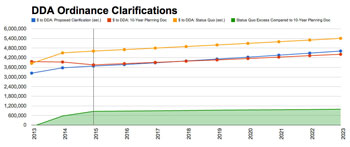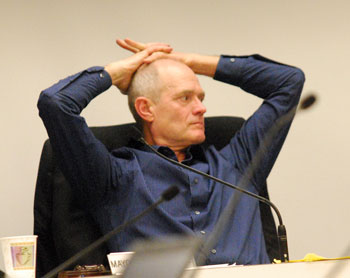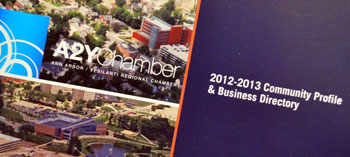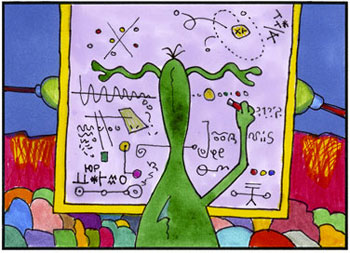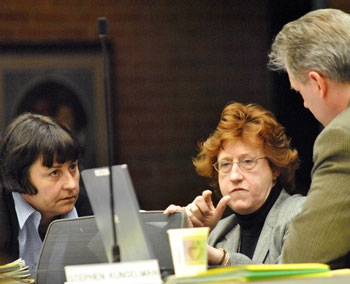Back in the spring of 2011, the Ann Arbor city council and the Downtown Development Authority were arguing bitterly about money.
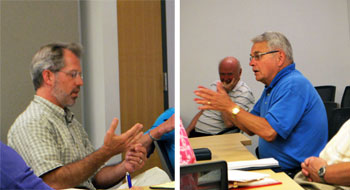
(Left) Ward 3 city councilmember Stephen Kunselman. (Right) DDA board member Bob Guenzel.
Now two and a half years later, a solid working relationship between the two entities has evolved – unmarred by political machinations, based instead on a clearly understood shared past, and consensus interpretation of relevant statutes and local laws governing tax increment finance capture.
That has led to a joint working session between the entities scheduled for Sept. 9, 2013. The session will offer an opportunity for members of the organizations to exchange appreciation and praise for the positive turn the relationship has taken over the last 30 months.
Heh. That’s a joke, as is the headline – the only accurate part of the preceding two paragraphs is the fact that a Sept. 9 working session is scheduled.
And it’s fair to say that the working session between the two groups would probably not be taking place unless it were contractually obligated – under an agreement ratified in May of 2011. The DDA operates the city’s parking system under that contract. In addition to the convening of a joint working session every fall, the contract stipulates that 17% of the gross parking revenues are to be paid to the city.
Parking money is just one of the two revenue categories over which the city and the DDA have been bickering. The other is the DDA’s tax increment finance capture (TIF), which is regulated by Chapter 7 of the city code. With an initial approval of changes to Chapter 7 already approved by the council on April 1, 2013, a joint DDA-city council committee was tasked on July 1, 2013 with making a recommendation on Chapter 7 changes to the council.
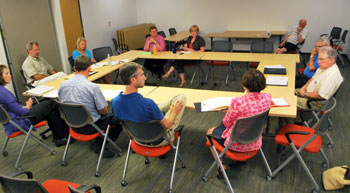
Aug. 26, 2013 meeting of the DDA-council committee, held in the basement of city hall.
Representing the council on the joint committee are Stephen Kunselman (Ward 3), Christopher Taylor (Ward 3), Jane Lumm (Ward 2) and Sally Petersen (Ward 2). Representing the DDA are Sandi Smith, Roger Hewitt, Bob Guenzel and Joan Lowenstein.
Despite being tasked by council on July 1 to begin meeting immediately, the committee did not meet until eight weeks later, on Aug. 26 – after the Aug. 6 city council primaries. Here’s the political calculus: If Kunselman had lost the Ward 3 Democratic primary to Julie Grand, the balance of votes on the council might have shifted to clarifying Chapter 7 in the DDA’s favor.
Grand ran a campaign that was generally supportive of the DDA. But Kunselman has led the council’s effort to clarify Chapter 7 in a way that favors the city as well as the other taxing jurisdictions whose taxes are captured by the DDA. However, Kunselman prevailed – as did Ward 4 challenger Jack Eaton, who campaigned in part on the idea of limiting the DDA’s TIF capture through clarification of Chapter 7.
Because the committee waited until after the Aug. 6 primary to meet, the DDA members had a clearer idea on Aug. 26 about who they’d be dealing with in the near future. The outcome of the Aug. 6 primary meant that Kunselman brought a certain amount of confidence to the committee meeting on Aug. 26. At one point he stated: “… I don’t really have a lot of trust out in my neighborhoods about what the DDA does downtown, ok? And that’s how I have been able to galvanize my base, so to speak, to stay here and to keep this effort alive, so that we can get this ordinance changed … Some of that money, yes, should be returned to the taxing authorities.”
Now the only question mark on the committee is the independent Lumm, who faces a challenge from Democrat Kirk Westphal in the November election. Lumm has made it clear she supports a Chapter 7 revision that respects the interests of the other taxing jurisdictions. But Lumm’s re-election is not a foregone conclusion.
That’s why the opening gambit from the DDA’s side at the Aug. 26 meeting was to delay further, even though the council is scheduled to take a final vote on the Chapter 7 revisions at its Sept. 16 meeting. A future council that included Westphal, mayor John Hieftje, Chuck Warpehoski (Ward 5), Margie Teall (Ward 4), Christopher Taylor (Ward 3) and Sabra Briere (Ward 1) might have six votes that potentially could support the current approach to TIF calculations. But among those six, I think even Westphal, Warpehoski and Briere are capable of independent and rational thought on the question of TIF capture.
The delaying tactic on Aug. 26 emerges in a fairly obvious way if you read through the meeting transcript. [.pdf of 40-page transcript]. DDA members were more inclined to want to talk about general arguments for the existence of a DDA, professing uncertainty about why they’d even been invited to the table. Kunselman, Lumm and Petersen made it clear they were there to talk about clarifying the TIF calculations, not more general themes. It wasn’t clear whose interests Taylor was upholding, but he aligned himself policy-wise – as well as socio-linguistically – more with other DDA board members than with his city council colleagues.
The Aug. 26 meeting was highlighted by a number of misstatements or incomplete statements of historical fact – some serious enough that I worry about the ability of some of those at the table that day to effectuate good public policy.
Still, I think the meeting offered a glimmer of hope – from a guy whose history with the city of Ann Arbor is approaching an anniversary. On Sept. 15, city administrator Steve Powers will have been on the job exactly two years.
Powers, I think, offers a contrast with the previous city administrator Roger Fraser. On April 16, 2010 Fraser barred me from a meeting of a “working group” of councilmembers and DDA board members. Shielded from public view, the group was sorting out the terms of a new parking agreement. Powers, on the other hand, toward the end of the Aug. 26, 2013 committee meeting, had this to say: “If the committee is done commenting, you should provide for public comment, as it’s a public meeting.”
This column includes a brief outline of some factual points worth remembering – because they were misstated or incompletely stated at the Aug. 26 meeting. But first, a point about words. [Full Story]






